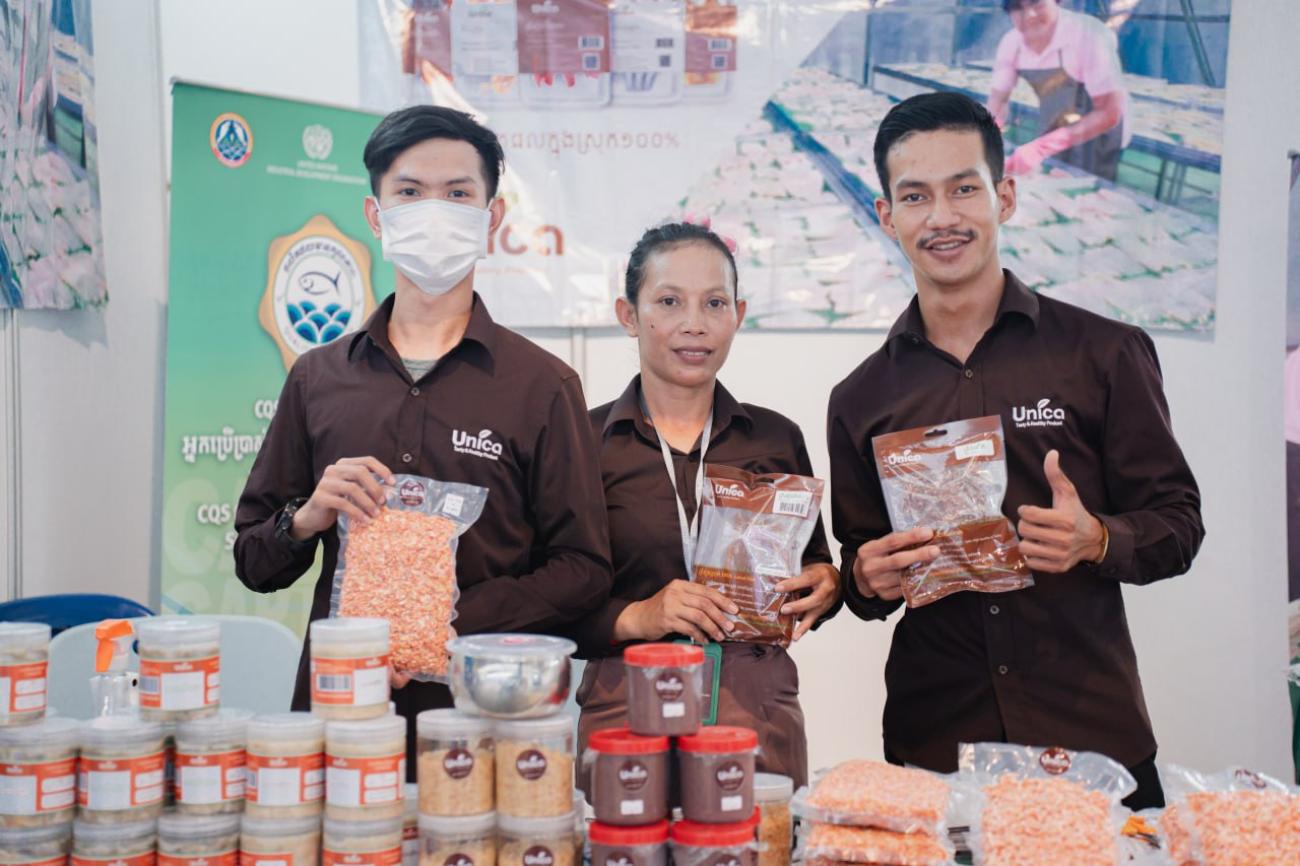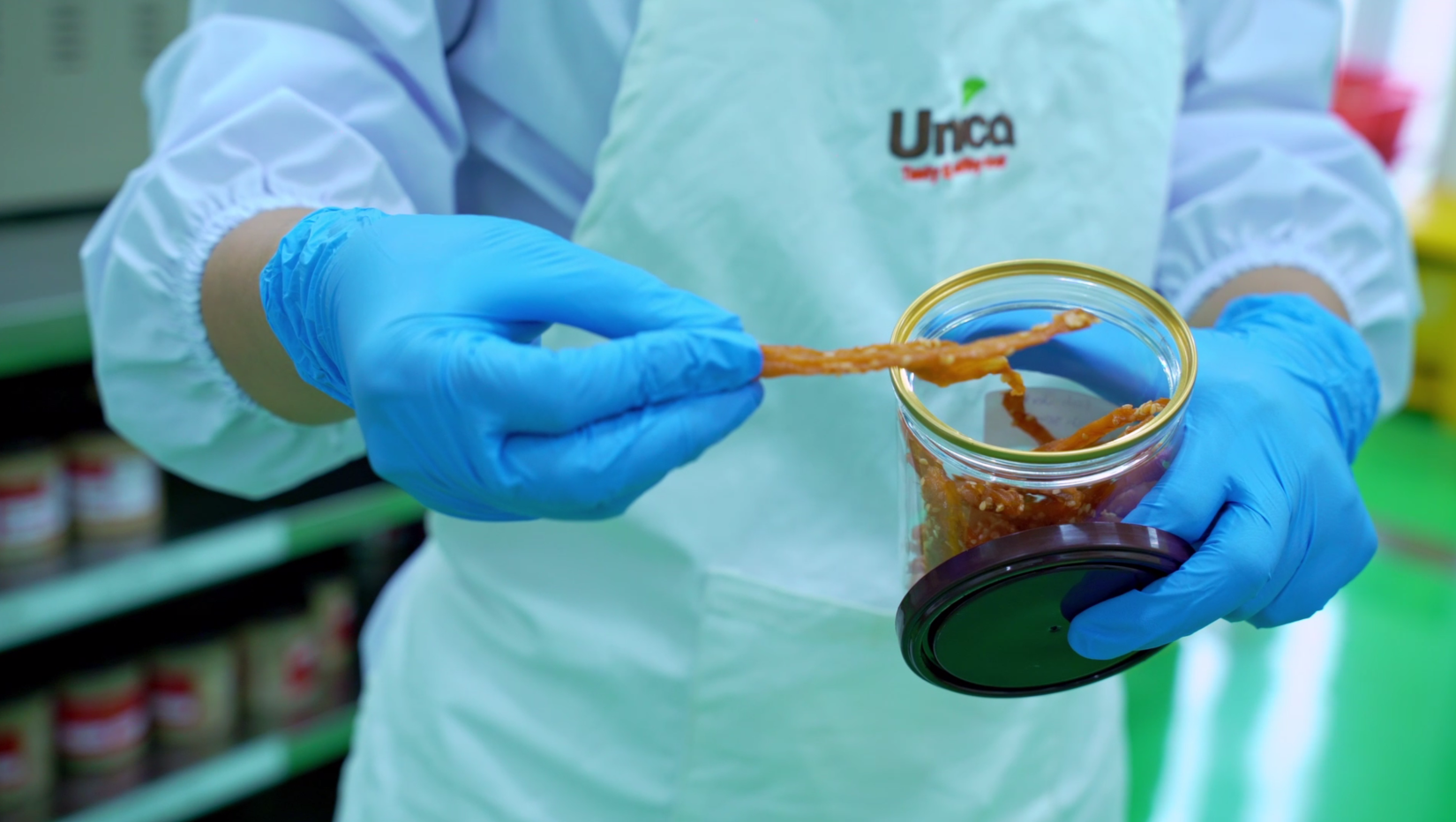How one fish-products business is helping others grow, with help from UNIDO, Government, and the EU

By Ms. Charya KHIM, National Private Sector Development Coordinator, UNIDO-CAPFISH-Capture Project
Along the Tonle Sap River and the coast of Cambodia are floating villages where whole lives play out on the surface of the water. These villages are home to many small businesses that produce dried fish, fillet fish, smoked fish, fish paste, and other foodstuffs popular with Khmer people.
Some of these businesses are run or staffed by women, and they tend to get less support than their male counterparts. That fact was noticed by Ms. Lep Mary, who, in 2014, saw a business opportunity. That year she founded her own enterprise, called UNICA, to support women’s fish processing groups in Pursat and Siem Reap provinces.
If she could bring these groups’ products to markets in Phnom Penh, she reasoned, she could boost their sales and turn a nice profit for herself as well. With hard work, she turned the idea into reality, selling processed fish foods to mid- and high-income consumers at markets in the country’s capital.
In fact, the idea worked so well that Ms. Lep expanded her operations and collaborated with agricultural cooperatives and still more fishing communities. Even after the expansion, however, UNICA was still a small operation. But the business model worked, and Ms. Lep understood there were opportunities for more growth, if only she had the resources necessary.
A HAPPY MEETING
It was in 2021 when Ms. Lep learned of an opportunity to get just what she needed to grow her business even further. The opportunity came in the form of a call for proposals by the CAPFISH-Capture project. CAPFISH-Capture was looking to develop the entire post-harvest fishery sector in Cambodia, and it asked for businesses to submit applications for its Value Chain Investment Support (VCIS) scheme.
The basic idea of VCIS is that every link in the “value chain” needed to be made stronger—from fish catch to processing, to shipping and distribution to marketing and sales. Only that way would the entire post-harvest fisheries sector grow. Ms. Lep applied for VCIS and was one of 50 enterprises that were awarded support. VCIS helps UNICA and other partners upgrade their business operations, meet food safety requirements, and improve competitiveness and access to markets.
Technical support from the project includes training and coaching on food safety compliance and certification, social and environmental management, business development, and business plan and market development. Not least of all, awardees are given equipment support valued at US $25,000. The equipment includes a mobile cooling room, a vacuum packaging machine, an ice maker, can seamers, water filtration, chillers, cutting tables, ingredient cabinets, lockers, and more.

THE BUSINESS GROWS
With the equipment and technical support from the project, UNICA has upgraded its business operations. UNICA distributes quality fishery products to markets by partnering with community fisheries, processing groups, aquaculture farmers, cooperatives, and micro-processors. These producer groups range in size from 10-30 members, most of them women. Being small-scale enterprises with few resources, they are sometimes not up to hygiene or quality standards. Many of the processors are people who work based on their own traditional knowledge, often gleaned from their parents.
UNICA helps bring the processing groups up to standard, so they can sell their products at quality markets in Phnom Penh and elsewhere. In order to lift these groups to standard, UNICA uses what is called an “internal control system,” or ICS, to track products along the supply chain. ICS calls for technical expertise, and UNICA has already built its substantial knowledge with the support of CAPFISH-Capture. What’s more, they could pass this vital expertise on to their suppliers—the women’s fish processing groups. Expertise provided with VCIS support included training on hygiene practices, processing techniques, grading, sorting, packaging, transporting, and storing.
With better hygiene practices, UNICA could help its suppliers access more markets in Cambodia and abroad. To boost its chances of getting access to foreign markets, UNICA participated in trade fairs and registered as a private enterprise under the Ministry of Commerce (MoC), registered in products code at the Ministry of Industry, Science, Technology and Innovation (MISTI), and it is working towards attaining better food safety standards and Hazard Analysis and Critical Control Points (HACCP) certifications.
THE BOTTOM LINE
The growth in operations has translated to a growth in sales. UNICA supplied its fish products to 20 markets in 2023, compared to 12 markets in 2021. According to UNICA, sales have increased by 30% in 2023. UNICA created six new jobs, half for women, and they’ve also helped create jobs for about 300 families in its 10 producer groups.
In late 2023, UNICA signed agreements with Makro markets and started negotiations with Lucky Supermarket and AEON, with which they expect to sign agreements in 2024. UNICA is now also pilot testing its products with two new buyers in Korea and New Zealand, and is gearing up to sell to other foreign markets. UNICA's trust among its buyers has increased due to the upgraded facilities and being certified by the Cambodia Quality Seal, meaning it meets the quality standards set by the Government.
The benefit of this work goes not to UNICA alone, but also to the suppliers. The number of suppliers—specifically, women’s groups and cooperatives—has grown from three in 2021 to ten in 2023. And that number only promises to increase. “CAPFISH-Capture has given UNICA a steppingstone to scale-up our business,” says Ms. Lep. “This has also enabled our business partners to improve their skills and their incomes.”
The relationship will continue to grow, says Ms. Lep, as UNICA takes advantage of CAPFISH-Capture’s research and development support, known as the Food Technologies, Research and Innovation Platform, or FTRIP, a pioneer in public-private-academic partnerships. With this support, UNICA will work with university-based scholars in Phnom Penh to conduct research on ready-to-eat fish jerky and its shelf-life. UNICA will also be exploring new smoked fish products. These efforts will help diversify the company’s product line.
“I’m looking forward to what the future will bring,” says Ms. Lep. “With support from CAPFISH-Capture, I believe UNICA will grow, as will our suppliers, and all of Cambodia.”



